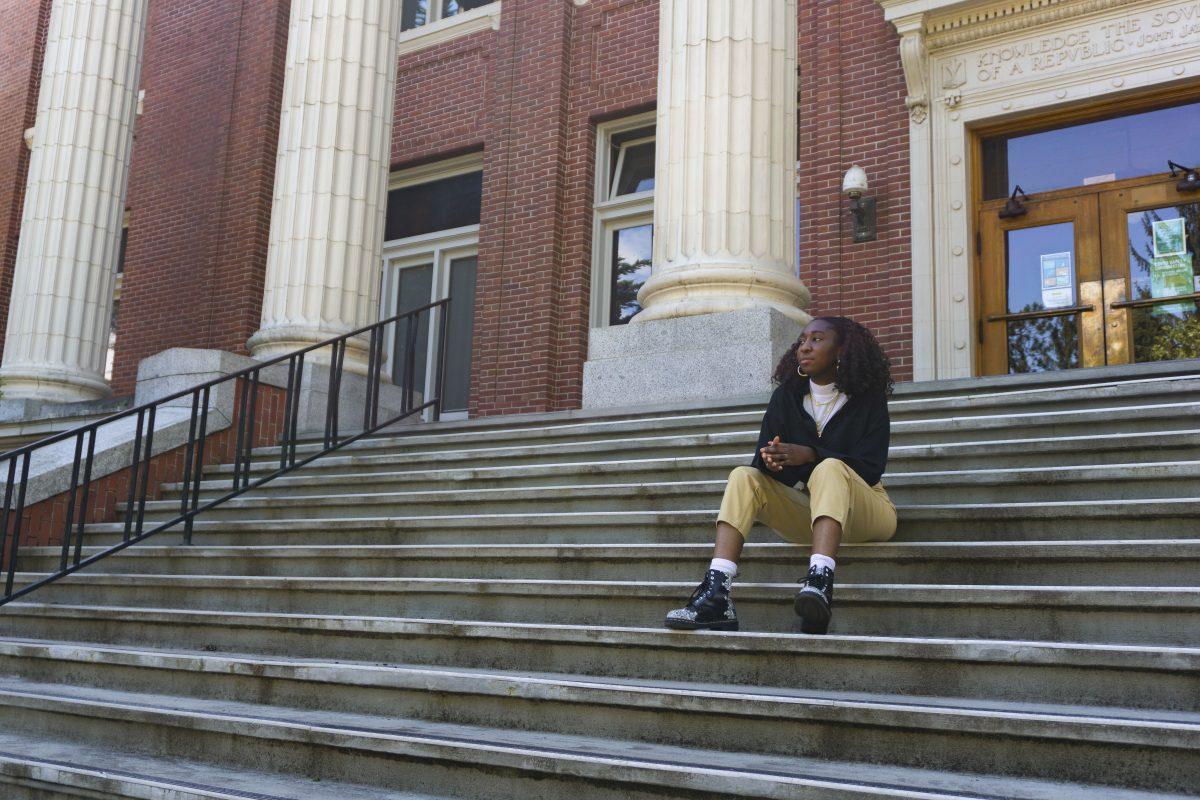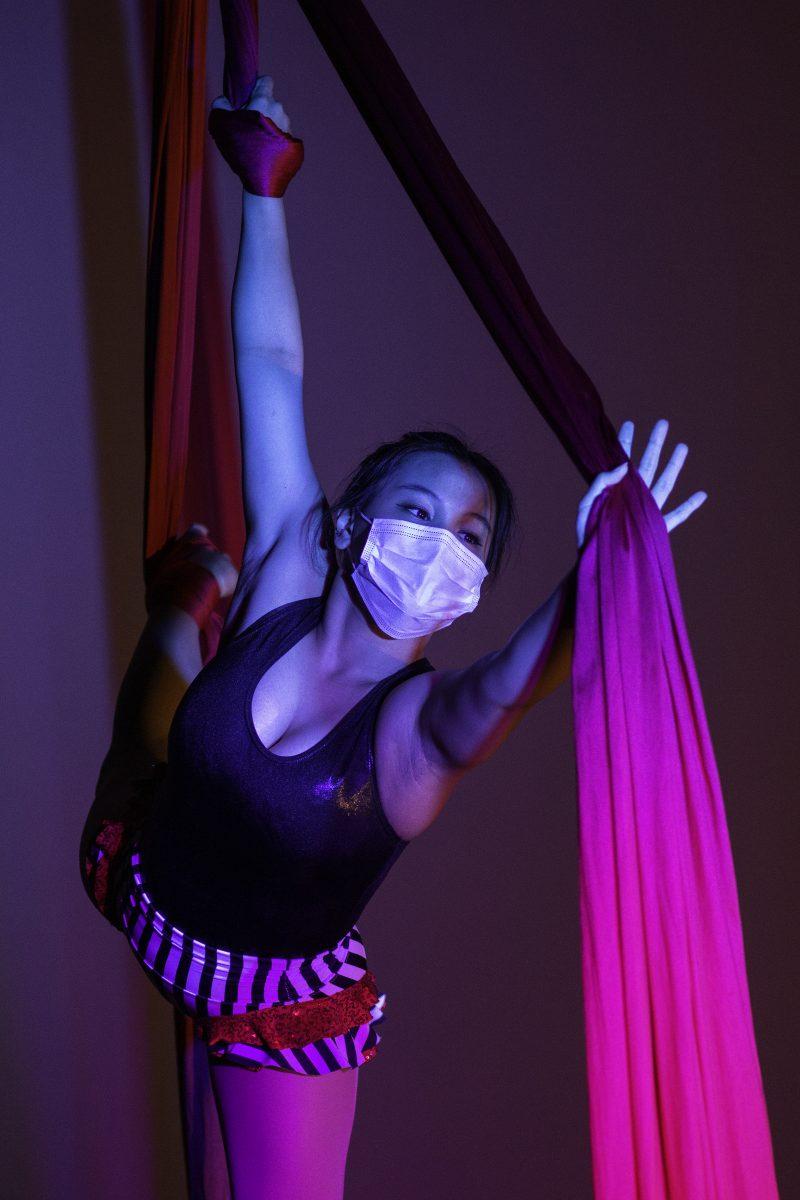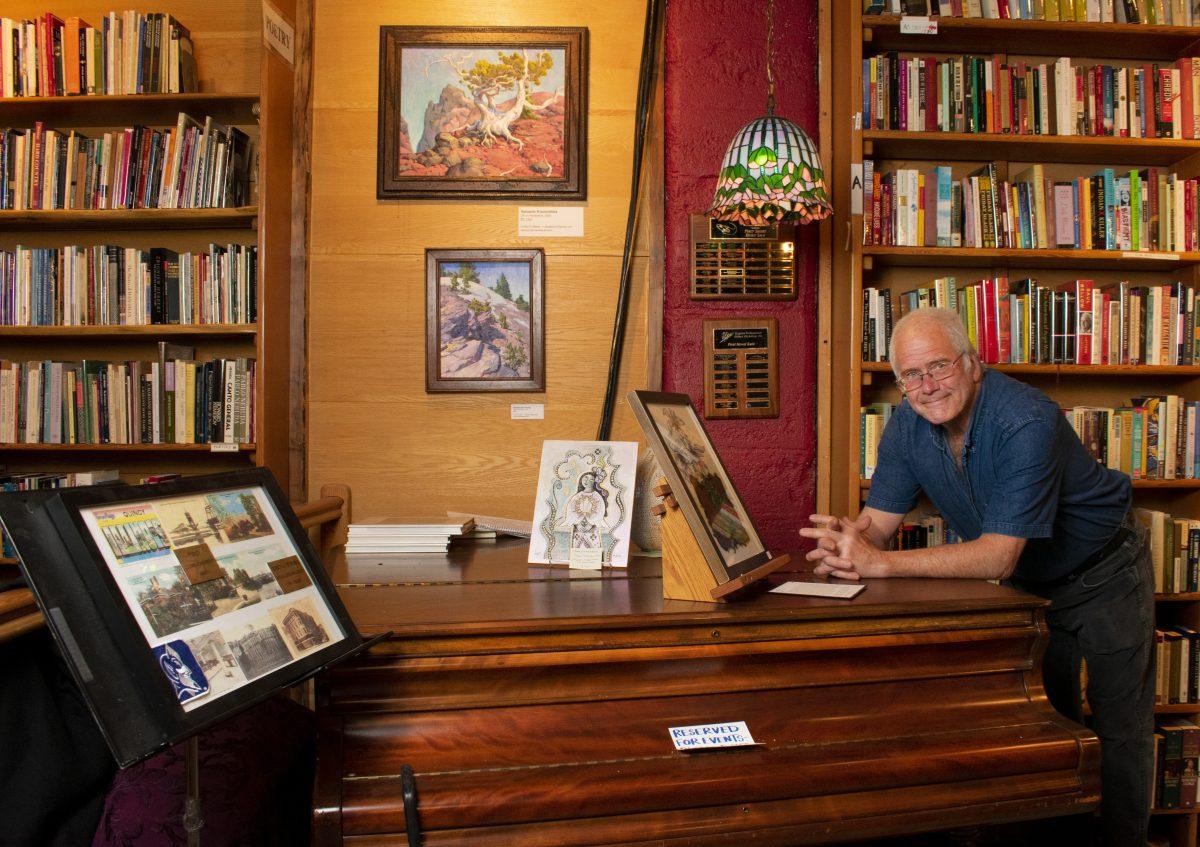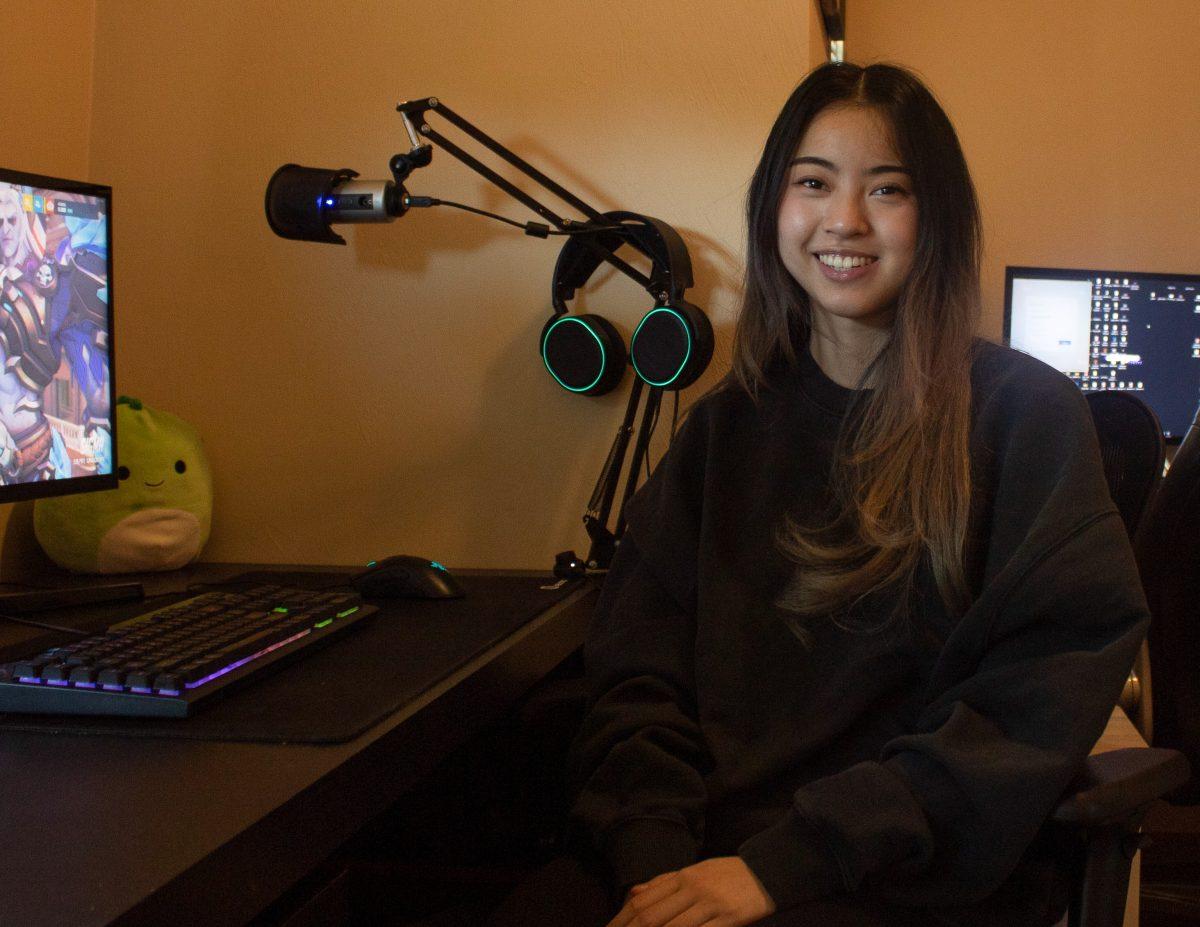It is 1:30 a.m. With aching feet, Jeremy Williams, a journalism and media studies major at the University of Oregon, finishes an 8-hour shift at 7-Eleven.
Williams will wake up at 8:30 a.m. He will grab his camera equipment, put on his white climbing helmet with the word “PRESS” slapped on all sides, run back to 7-Eleven for an energy drink and then catch a ride to the Springfield Library. There, he will spend eight hours shooting a Black Lives Matter protest.
Between June 2020 and April of this year, Williams photographed protests around Oregon as an unpaid freelance photography intern for KVAL and KEZI 9, two Eugene-based news stations. Some weeks, he would work more than 40 hours between 7-Eleven and covering protests, all on top of being a full-time student at the University of Oregon.
“I don’t like unpaid internships, but I feel like they’re kind of necessary for that first step. It’s just hard to do when you’re a student, and you have to juggle everything else going on,” Williams says.
In May, Williams quit his job at 7-Eleven because he got a paid internship through the Snowden Program for Excellence in Journalism through the UO. The program sets up emerging journalists with paid internships in Oregon and provides them with a housing stipend.
“The only reason I was able to accept it, or really consider going into the Snowden program, was because it was a paid internship,” Williams says. He will be working 40 hours a week for the Register-Guard in Eugene starting at the end of June.
Much like Williams, university students around the country are scrambling to find opportunities they can add to their resumes. Nearly 91 percent of employers prefer their job candidates to have work experience. Over half want students to gain this experience from an internship or co-op, according to a 2017 survey by the National Association of Colleges and Employers.
The survey showed that 60 percent of college students hold an internship at some point during their college careers, but 40 percent of these internships are unpaid. Many students take on unpaid opportunities because they don’t feel they have another option. As Brittany Bosworth, a student at the UO who has two unpaid internships, says, “If it is paid, it’s very competitive.”
Bosworth began searching for internships last summer. By the fall, she had applied to over 50 paid and unpaid opportunities. She now interns at a New York-based lifestyle publication, the Garnette Report, and a Eugene-based nonprofit called A Family For Every Child. Both are unpaid. While Bosworth says she is grateful to have both internships, she sometimes wishes her employers compensated her.
One of the ways many students try to benefit from internships is through university credit. Bosworth’s internships offered university credit in their contracts, but she had all the necessary credits lined up for her Public Relations degree and decided that earning credit wouldn’t be beneficial.
While earning credit seems inherently favorable for students, many companies only offer a credit-earning option. That decision helps employers meet the Fair Labor Standards Act’s (FLSA) unpaid internship requirements.
The FLSA requires employers to meet several criteria when offering unpaid internships. For example, they must create an educational setting, accommodate student’s academic commitments and avoid implied and overt promises of compensation.
“If a company is asking their intern to coordinate their social media, and they would normally pay someone to do that, then that has legal complications,” says Rachel Allen, the Associate Director of Student Services for the UO’s School of Journalism and Communication.
Though the FLSA seems clear, it is quite nebulous.
“Employers have a hard time interpreting it,” Allen says. “Oftentimes, they feel that if they require a student to receive internship credit, then it’s supporting an educational interest, and it’s mitigating any sort of concern about the ethical and legal complications.”
While Allen tries to help students understand whether or not they need the credit to graduate –– and whether or not they are being taken advantage of –– mandatory credit can be a limitation.
Lena Totah, a public relations major in her final year, has noticed internships on Indeed and Handshake frequently state that university credit is a requirement. For her, it has only created another barrier.
“I don’t want university credit because I don’t need it, and then I’m just paying to work,” Totah says.
The UO typically counts internship credits as a major-specific elective, and they require students to enroll in a class. One four-credit internship course can be over $1,000 for a single term, forcing students to pay for vital professional experiences.
Despite the questionable ethics surrounding the pay-for-credit model, many students at the UO apply for internship credit through the university.
Lisa Deluc, a third-year UO cinema studies and English student, was excited about this option when she took on an internship at the beginning of 2021. As a double-major, the prospect of earning class credit and engaging in professional experience at the same time seemed too good to be true.
Starting last year, Deluc applied to 15 paid internships. Failing to receive any responses, she cold-emailed a nonprofit in Seattle that agreed to contract her with 10 hours of unpaid work a week.
In the middle of April, her internship ended, so Deluc reached out to the Cinema Studies department to receive credit. They informed her that it would not be possible because her internship failed to occur during a single term –– starting in the middle of winter term and ending in the middle of spring term.
The UO runs on a trimester schedule, rather than the semester schedule that most schools use. Because many internships follow a semester schedule, it can be hard to register in time.
“The chances of getting an internship are already so low,” Deluc says. “So the chances of getting an internship that starts right before term registration and finishes at the end of the term? That feels impossible.”
After Deluc learned that she needed to enroll in a term-long course to receive credit, she also realized there would be a fee involved, something she wasn’t expecting.
“It’s frustrating that this is the only way to receive credit,” Deluc says. “Why should I have to pay for my free labor?”
Despite Deluc’s internship being unpaid, she is looking forward to using it as a resume-builder when she applies to internships in the future. She also says she will only be looking for paid opportunities.
For some, unpaid internships are totally off the table. Maisy Rappe, a natural resources conservation student at Oregon State University, works a full-time job over the summer and a part-time job over the school year to pay for her rent and $4,000 per term tuition fees. Being self-supporting, Rappe recognizes she doesn’t have 40 hours a week to work a job and 40 hours a week to do an internship.
“I’ve tried to talk to my advisor about how I can’t do an unpaid internship, but the only advice I’ve ever been given is to try and find the time,” Rappe says.
But Rappe can’t seem to find a paid internship, as they are the most sought after. She has noticed they also require individuals to have an experience with an unpaid one first.
“It sort of sets you up to fail,” Rappe says. “They don’t take you into consideration as a human being.”
Primary internship experiences are a key determinant of future success in the internship market. One study by the IZA Institute of Labor Economics found that employers are 25 percent more likely to contact applicants with previous internship experience than with other types of work experiences. And that prior internship experience raised the probability of a positive response for a subsequent internship by about 30 percent.
Deluc, who works a part-time job to help cover her expenses, was initially nervous about taking on an unpaid opportunity. Still, she knew that her unpaid internship would open the door for paid opportunities.
“I wanted experience, and none of the paid internships that I had applied for were wanting someone without experience,” Deluc says. “A lot of paid internships require that you have at least some unpaid experience.”
Many internships also start as unpaid experience before they turn into something paid. Bosworth’s internship with the Garnette Report was initially an unpaid experience, but at the end of May, Bosworth received an offer from her boss to join the team. This offer included a stipend and the opportunity for growth. Bosworth will be moving to New York City starting this August.
The UO tries to provide these door-opening experiences through Global Education Oregon (GEO) study abroad programs. GEO has an internship-based program called GlobalWorks and allows students to add an internship to many traditional programs.
In 2018, Totah participated in a pay-for-credit internship through the GEO Liberal Arts in London program. She found the experience useful when she applied to her current job as a social media promotions coordinator for Connect the Ducks. During the interview, Totah says the main thing she talked about was her GEO internship.
“It was a lot of social media, communications and marketing work, which I think probably looks good.” Totah says. “And for a lot of applications that I’m seeing, they say you must have a prior internship experience, and so at least I have that now.”
Dennis Galvan, Dean and Vice Provost of the Division of Global Engagement at UO, believes that GEO’s internships create global citizens, provide hands-on experiences and facilitate career readiness.
“You kinda have to break in somehow, and this is a relatively easy way to break in. Especially if you add the international piece, it makes it look even cooler,” Galvan says. “The nice thing about these GlobalWorks internships is that, yes, you’re not getting paid, but you get over the catch-22 because then when you graduate, you can say ‘oh yeah I did work in PR in Tokyo.’”
But GEO’s internship-based programs can be expensive. For example, Totah’s program had an estimated cost of over $24,000 for one term of study.
“For a lot of people, it’s their only option, which also sucks because I could afford it because I had help from my grandparents,” Totah says. “But there’s so many people who just can’t afford that and who need to be paid for their work.”
Unpaid internships also pose a problem for extraneous expenses, such as transportation, housing, groceries and more.
Allen spoke of one student who did an internship at a nonprofit in San Francisco. The only way the student could do the internship was because they were able to stay with their sister, who lived there.
Handshake, an online jobs platform marketed towards college students, cites New York City, Los Angeles, Chicago and San Francisco as some of the best cities for internships, but they are also some of the most expensive places to live in the United States. For example, three months of rent in New York City averages at nearly $9,000, according to a 2020 Kiplinger survey.
While the coronavirus pandemic briefly halted this barrier with the rise of remote internships, as more people receive the COVID-19 vaccine and normalcy becomes palpable, it is hard to know if remote internships are here to stay.
University of Oregon departments are becoming increasingly aware of the importance of internships and the problems associated with unpaid internships. Their goal is to mitigate as many barriers as possible.
Some UO departments, like the Lundquist College of Business and the School of Journalism and Communication (SOJC), have funds in place to help offset the cost of unpaid internships.
The SOJC created its fund to support diverse students and those with high financial need. The development raised over $90,000 on Ducks Give Day in May, a fundraiser that focuses on supporting student success initiatives.
“We recognize that students do participate in unpaid, or low paying, professional experience opportunities. And so what we’ve found is that students who work a lot of hours to pay for food, rent and tuition don’t have time to participate in unpaid opportunities, so it’s really disadvantaging this population of students,” says Allen, who proposed the fund and is hopeful that it will carry over every term.
The program provides students with stipends of around $2,000, an amount that will hopefully provide sufficient support but still push companies to pay student interns when possible, says Jessika Kaiser, the SOJC’s assistant director for donor relations. Additionally, companies will need the Fair Labor Standards Act to ensure legitimate opportunities.
“We want to make sure that the student really finds their voice and isn’t taken advantage of in any way,” Allen says.
There have also been university-wide initiatives to increase internship accessibility.
Jane Gordon, vice provost for Portland’s UO campus, spearheaded the Portland Internship Experience back in January. The program, which begins in June, awards 30 student interns a $5,000 stipend to work 40 hours a week throughout the summer.
The program aims to remove as many structural inequities as possible, specifically by including pay, reaching out to an assortment of student populations and emphasizing career readiness.
While internships are the top thing cited by employers when making decisions about candidates, Paul Timmins, executive director of the UO’s Career Center, also wants students to know that experience is more than just internships.
“I want students to realize that there are other ways they can be active in their community. A good part-time job, a leadership or volunteer experience, those things can also be resume-worthy, career readiness experiences,” Timmins says.
Universities are starting to take things into their own hands, but unpaid internships do not appear to be going away anytime soon. Many students, such as Williams, know they are important for their careers.
After Snowden, Williams plans to look for another internship opportunity. While he would love to have a paid internship, he says that if there is unpaid work to do, then he will take it. But an unpaid experience means he will have to find paid work somewhere else to pay the bills.
“Yeah. It’s not easy,” William says.









![[Photo Courtesy of the Lara Family]
Ruben embraces his beloved childhood goat, Katrina.](https://ethos.dailyemerald.com/wp-content/uploads/2025/05/katrina-1-1060x1200.jpg)





